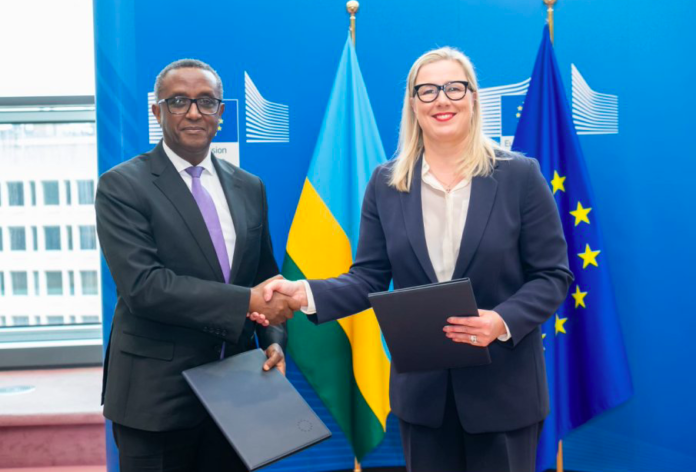Brussels, February 19, 2024- The European Union (EU) and Rwanda have formalized their partnership through the signing of a Memorandum of Understanding (MoU). This pivotal agreement was inked by Jutta Urpilainen, the Commissioner for International Partnerships representing the EU, and Vincent Biruta, Rwanda’s Minister of Foreign Affairs, marking a milestone in collaborative efforts to enhance sustainable development and strengthen value chains across Africa.
The MoU delineates five key areas of cooperation, aiming to integrate and support the economic diversification of sustainable raw materials value chains. These include ensuring the sustainability and effective functioning of these value chains, promoting sustainable and responsible production and valorization of critical and strategic raw materials, mobilizing funding for necessary infrastructure, enhancing research and innovation, and building capacity to enforce relevant regulations.
This partnership underscores a shared commitment to advancing sustainable practices and responsible sourcing of critical raw materials such as tantalum, tin, tungsten, gold, and potentially lithium and rare earth elements, which are vital to Rwanda’s economy and the global market. Rwanda’s strategic role as a major player in tantalum extraction and its potential in other minerals positions it as a key partner in this endeavor.
The EU’s Global Gateway investment plan is set to play a crucial role in this partnership, providing financial support for skills development in the mining sector, enhancing transparency and traceability, and facilitating the mobilization of funds for infrastructure development. This initiative is part of the EU’s broader strategy to ensure a sustainable supply of raw materials, crucial for achieving green and clean energy objectives.
The signing of the MoU with Rwanda adds to a series of partnerships the EU has been establishing with resource-rich countries, including the Democratic Republic of the Congo, Zambia, Namibia, and others outside Africa like Argentina, Canada, and Ukraine, to build sustainable raw materials value chains.
The Global Gateway strategy represents the EU’s commitment to addressing the global investment gap, fostering smart, clean, and secure connections across various sectors, and promoting sustainable development. By mobilizing up to €300 billion in investments, the EU aims to create essential links that benefit global partners and Europe, fostering prosperity and security without creating dependencies.
Commissioner Thierry Breton highlighted the importance of the partnership in building a resilient and sustainable value chain for critical raw materials, emphasizing transparency, traceability, and investment. Jutta Urpilainen reflected on the strategic nature of the partnership, underscoring its benefits beyond trade and investment, focusing on sustainability and the welfare of the planet and its inhabitants. Vincent Biruta, reaffirming Rwanda’s commitment, emphasized the agreement’s role in enhancing the quality and traceability of Rwanda’s raw materials, positioning the country as a reliable partner in the global market.
This EU-Rwanda partnership represents a forward-thinking approach to global trade and environmental sustainability, setting a precedent for future international cooperation in the critical raw materials sector.































































